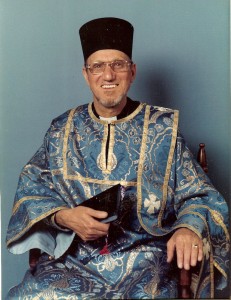Protodeacon Thomas Ernest Goddard CAPP (1916-1991)

Thomas Capp entered the ministry of the Church late in life and, in the normal coyurse of events, his educationalk standards would have been insufficient to qualify him for ordination. What he lacked in intellect and formal education, however, he more than made up for in his devotion to the Church, his sweetness of temperament and his simple great of the Lord.
Born at Bexleyheath, Kent, on 19 May 1916, Thomas Capp was educated at Graham Road School, Bexleyheath, where he sat and passed his matriculation. This would have enabled him to enter Dartford Grammar School but his family’s straitened circumstances led him to join the local technical school instead. At the age of sixteen he entered upon an engineering apprenticeship with Vickers Armstrong at Erith, where both his father and grandfather worked. When the firm closed at Erith he transferred to its Dartford branch to complete his training and was soon promoted to the position of Technical Assistant Foreman.
When war broke out in 1939 Thomas applied to join the R.A.F. but the Ministry of Aircraft Production required his services for laboratory technical work at Fort Halstead, where he jokingly referred to himseld as “one of Mr. Churchill’s boffins.” After the war he took a sea-going post as an engineering offivcer. On returning to shore duties he studied to become an Automated Industrial Technician with Foxboro Yoxall, a large Americal instrument company. After five years there he took up the post of Electrical Mechanical; & Instrument Engineer with Standard Telephones & Cables, where he remained for the next twenty years until his retirement.
As a boy Thomas had always had a close cionnection with his local church. He regularly attended the Sunday School and from the age of seven was active both as a chorister and as a member of the Boys’ Brigade. Once he left school he joined the Men’s Christian Society, but the war years interrupted his involvement. After the war he trained as a server at Dartford and was active at his the Anglican parish church at Barnehurst.
After the death of his parents, when he moved to Plumstead, Thomas became friendly with Charles Wilkins, organist at a number of local Anglican churches. Charles Wilkins was an accomplished musician and music teacher who had studied under the late Archbishop John Churchill Sibley in his youth. He had subsequently received ordination from a bishop in Old Catholic orders but had not pursued an active ministry. Shortly before his death in April 1977 he had made contact with Abba Seraphim to diuscuss the possibility of resuming his ministry and had spoken enthusiastically to Thomas of the existence of an Orthodox parish in nearby Blackheath.
Charles Wilkins’ sudden death, however, not only deprived Thomas of a friend and mentor, but left him without any means of contact with the Orthodox Church, of which he had heard so much. Undeterred Thomas set off for Blackheath anxious to discover Orthodoxy for himself and in the Spring of 1978 he attended his first liturgy at Blackheath. Following instruction he became Orthodox in November 1978. His devotion and commitment were instantaneous and he not only regularly attended all services and parish functions, but alsio suought further instruction. He was a paryticular favourite of the late Metropolitan Georgius in his last months and at church functions it was always Thomas who was there with a kindly word and a helping hand for the failing hierarch.
In November 1979 Thomas entered minor orders with the intention of progressing to the permanent diaconate, to which he was ordained at the hands of Abba Seraphim on 12 July 1981. His dependanbility and popularity were such that his elevation as Protodeacon on 27 February 1983 was widely acclaimed and he was also appointed a General Trustee of the Church. In addition to his liturgical duties he nbecame conscientious in visiting and counselling elderly church members. During visits to the Brook Hospiutal he found himself very welcome by the staff and soon established himself as the hospital’s Orthodox chaplain, praying with patients and relatives and generally bringing the warmth of his simple humanity to support those in need. He became a familiar figure to the hospital staff and won their respect and affection. For many years Thomas served as a governor of De Lucy and Alexander McLeod Junior Schools in Plumstead and Abbey Wood, where he was regular in his attendance and conscientious in his support.
In 1986 ther Blackheath parish hosted a reception to mark his seventieth birthday, attended by his many friends and colleagues in the church. During 1991 he began showing signs of diminishing vitality and broken toe bones left him inactive for several weeks. A few months later he collapsed at home suffering from dehydration and was admitted to hospital, where he suffered a stroke and lapsed into unconsciousness. He died fortified with the rites of the church on 30 October 1991 aged 75 years.
Protodeacon Thomas would have been a credit to any church with his unassuming manner, natural humilty and genuine warmth of heart, but an insistence on intellectual attainment would have barred him from a ministry which blessed many. His talents, the common touch and identity with those in need of pastoral care – cannot be underestimated. They were a gift from God, as was Thomas to those who knew and loved him.
